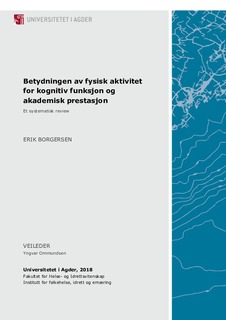| dc.contributor.author | Borgersen, Erik | |
| dc.date.accessioned | 2018-09-25T07:29:38Z | |
| dc.date.available | 2018-09-25T07:29:38Z | |
| dc.date.issued | 2018 | |
| dc.identifier.uri | http://hdl.handle.net/11250/2564202 | |
| dc.description | Masteroppgave idrettsvitenskap ME517 - Universitetet i Agder 2018 | nb_NO |
| dc.description.abstract | Objectives: This review aims to give an overview of studies providing evidence for a relationship between physical activity and cognitive function or academic achievement in children of normal development ≤ 18 years of age.
Theory: The relevant research are introduced.
Methods: This study is a systematic review. SPORTDiscus, CINAHL Plus with full text, MEDLINE, Academic Search Complete, Health and Psychosocial Instruments and ERIC were searched for relevant articles. A total of 23 articles were included. Methodological quality was assessed. Codes on dissimilar categories of intervention differences were developed. The notion of credibility in outcomes came forth through four levels of evidence that considered methodological quality and the outcome of the studies.
Results: A synthesis were developed to present an assembly of all the findings. Quality score included, the synthesis provides findings of cognitive function (75.7%) and academic achievement (24.3%). Sufficient quality score was found in 76.5% of the studies. A model was developed on the bases of the synthesis. Both the model and the neurobiological or psycho social hypothesis support a causal relationship. Progression in cognitive function was found after acute physical activity interventions in 63.6% of the outcomes. Among the chronic physical activity interventions, progression in cognitive function and academic achievement were found in respectively 38.5% and 11.5% of the outcomes.
Discussion: All studies have remarks on external validity and generalization. All studies have remarks on internal validity and causality. Only 35% of the studies had adequate sample size. A sensitivity analysis examining the search method, eligibility of studies, study outcomes and questions in relation to publication bias, was found to be “sound”.
Conclusions: Physical activity has an effect on cognitive function and academic achievement. This systematic review provides a robustness in evidence that give implications for physical activity that contain cognitive enrichment. | nb_NO |
| dc.language.iso | nob | nb_NO |
| dc.publisher | Universitetet i Agder ; University of Agder | nb_NO |
| dc.rights | Attribution-NonCommercial-NoDerivatives 4.0 Internasjonal | * |
| dc.rights.uri | http://creativecommons.org/licenses/by-nc-nd/4.0/deed.no | * |
| dc.subject | ME517 | nb_NO |
| dc.title | Betydningen av fysisk aktivitet for kognitiv funksjon og akademisk prestasjon : Et systematisk review | nb_NO |
| dc.type | Master thesis | nb_NO |
| dc.subject.nsi | VDP::Medisinske Fag: 700::Idrettsmedisinske fag: 850 | nb_NO |
| dc.source.pagenumber | 142 s. | nb_NO |

